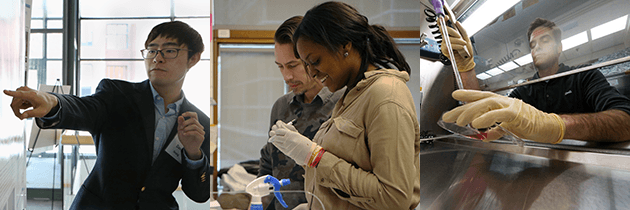 The Harvard Stem Cell Institute (HSCI) is pleased to announce the success of the 2015–16 General Fund Matching Challenge. Throughout fiscal year 2016, HSCI saw an outpouring of unrestricted funding, resulting in $2.6 million in new gifts and pledges. This support came from over 110 donors making commitments at a variety of levels, with many new donors supporting the Institute for the first time. Funding for the Matching Challenge was generously provided by an anonymous group of donors who have been leaders and supporters of HSCI for many years. HSCI is grateful to the Challenge fund donors for their support and inspiration, and to the many donors who responded to this funding need.
The Harvard Stem Cell Institute (HSCI) is pleased to announce the success of the 2015–16 General Fund Matching Challenge. Throughout fiscal year 2016, HSCI saw an outpouring of unrestricted funding, resulting in $2.6 million in new gifts and pledges. This support came from over 110 donors making commitments at a variety of levels, with many new donors supporting the Institute for the first time. Funding for the Matching Challenge was generously provided by an anonymous group of donors who have been leaders and supporters of HSCI for many years. HSCI is grateful to the Challenge fund donors for their support and inspiration, and to the many donors who responded to this funding need.
"Unrestricted funding is absolutely critical to HSCI's exploration of early-stage science needed to solve some of the most vexing questions of our time pertaining to disease," remarks Xander University Professor and HSCI co-director Douglas A. Melton. "In providing unrestricted funding, our supporters demonstrate a great deal of confidence in our research community and our leadership, and for that, we remain deeply grateful."
David Scadden, Gerald and Darlene Jordan Professor of Medicine and HSCI co-director, recently elaborated on the importance of unrestricted funding as well. "The General Fund Matching Challenge has brought increased focus and attention to HSCI's need for unrestricted support," says Scadden. "One of the key strengths of HSCI lies in its ability to convene experts from a variety of backgrounds and institutions, enabling them to develop innovative solutions to complex problems. Unrestricted funding gives us the flexibility to invest in promising new research that will have an impact both in the scientific research community and, ultimately, in the patient community."
In the past year, unrestricted funding has strengthened HSCI's Disease Programs, including the recently launched Skin Program and new projects in the Cardiovascular, Kidney, and Nervous System Diseases Programs. Unrestricted funds also supported nine Seed Grant projects in areas ranging from cancer to musculoskeletal disease. The HSCI General Fund also helps support other priorities such as the HSCI Internship Program. The program recently graduated its 12th intern class, comprised of 35 interns selected from an international applicant pool of 800.
Earlier this year, Professors Melton and Scadden led a conference call to give an update on recent developments at the HSCI, many of which are funded through unrestricted support. To hear a recording of this call and to learn more about how unrestricted funds are supporting key HSCI priorities, please click here.
